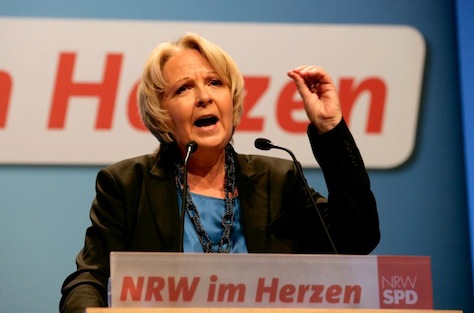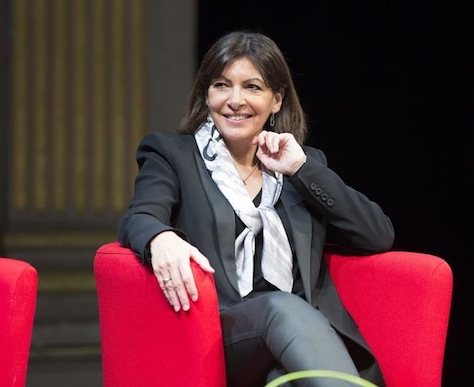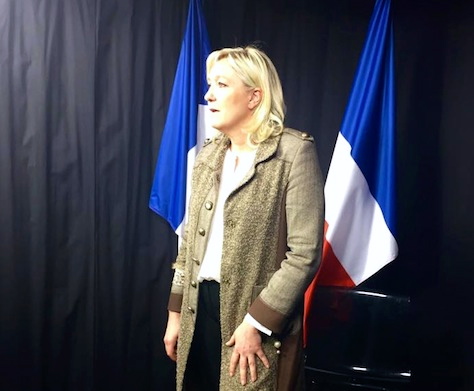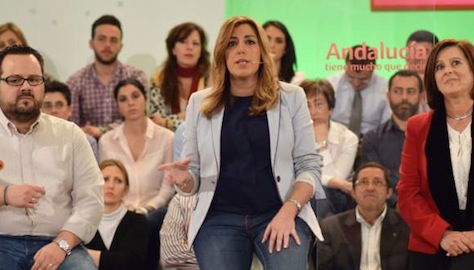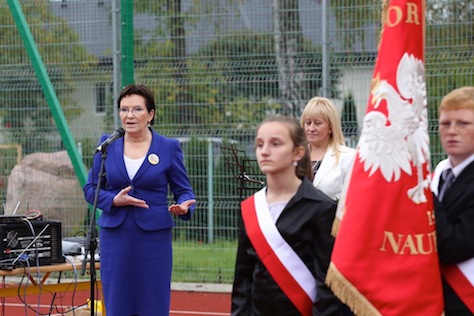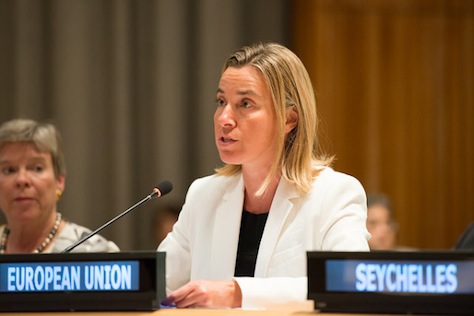Part of the undeniable appeal of Hillary Rodham Clinton’s presidential campaign is her push to become the first woman to lead the United States, enhanced by the fact that she aims to succeed the first African-American president.![]()
But, if elected, Clinton will be far from the only powerful woman on the world stage.
If she wins the November 2016 presidential race, she’ll join a list of world leaders that includes German president Angela Merkel, Liberian president Ellen Johnson Sirleaf, Lithuanian president Dalia Grybauskaite, Brazilian president Dilma Rousseff, Danish prime minister Helle Thorning-Schmidt and Chilean president Michelle Bachelet.
What’s more, there’s never been a better moment for women leading their countries. Assuming that Clinton wins the presidency in 2016 and serves two terms, it’s not inconceivable that she’d lead the United States at a time of ‘peak’ female leadership. But nowhere is that more true than in Europe. In fact, it’s not inconceivable that each of the six largest member-states of the European Union could have women in charge during a potential Clinton administration.
Here’s who they are — and how they might rise to power.
1. Hannelore Kraft
North Rhine-Westphalia’s minister-president
By the time of the next elections in 2017, it will have been a dozen years since Germany’s Sozialdemokratische Partei Deutschlands (SPD, Social Democratic Party) won an election.![]()
Nevertheless, the SPD will have spent eight of the past 12 years as the junior partner in chancellor Angela Merkel’s ‘grand coalition’ governments. The center-left SPD has also suffered from Merkel’s canny ability to position herself as an ideological moderate, and the party’s record in government alongside Merkel has made it difficult for the SPD to draw distinctions with Merkel. That’s especially true when the SPD nominates uncharismatic federal ministers for chancellor.
Enter Hannelore Kraft, the minister-president of the most populous German state, North Rhine-Westphalia. In contrast to the SPD’s last chancellor candidate Peer Steinbrück or vice-chancellor and economy minister Sigmar Gabriel, Kraft could craft a much stronger contrast with Merkel in the next election as a leader who’s resisted austerity policies in government and pursued pro-growth policies instead. Kraft won reelection in 2012 to a second term in NRW, and she remains popular. Though Kraft, age 53, has denied interest in running for chancellor, she is young enough to wait until Merkel, at the height of her popularity, steps aside from active German politics.
2. Ursula von der Leyen
German defense minister
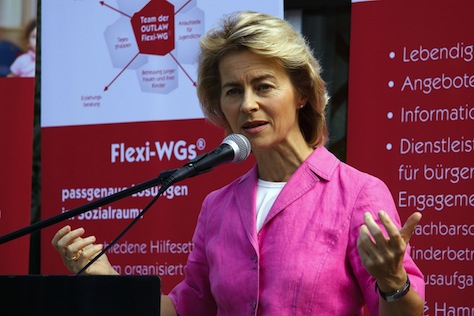 Photo credit to Dirk Vorderstraße.
Photo credit to Dirk Vorderstraße.
Angela Merkel, Germany’s current chancellor, would of course prefer a transition to someone in her own Christlich Demokratische Union Deutschlands (CDU, Christian Democratic Party). Fresh off the most dominant political victory of her career in September 2013, and the unofficial leader of Europe, Merkel shows no signs that she’s ready for retirement, and she may well push for a fourth consecutive term in elections likely to be held in 2017. ![]()
Nevertheless, after a decade as chancellor, Merkel has telescoped who she prefers to one day succeed her. It’s defense minister Ursula von der Leyen, a Merkel loyalist who served from 2005 to 2009 as minister for women, families and youth and from 2009 to 2013 as minister for labor and social affairs, where she championed greater paternity benefits aimed at raising the birth rate in a country that expects depopulation of nearly 25% in the decades ahead. Parsimonious conservatives within the CDU may not be enthusiastic about extending social welfare programs, nor are they delighted in von der Leyen’s boisterous support for European integration. But they’ve welcomed her hawkish tone as defense minister in pushing for stronger sanctions against Russia over its interference in Ukraine.
Von der Leyen, age 56, is the daughter of a former minister-president of Lower Saxony and a former gynecologist who has lived in both the United States and the United Kingdom.
3. Anne Hidalgo
Paris mayor
Former president Jacques Chirac, who served for nearly two decades as the mayor of France’s capital city, knows more than anyone else how powerful the office can be as a springboard for higher office, especially in a country as centralized — politically, culturally and financially — as France. ![]()
Anne Hidalgo won her first term as Parisian mayor last spring after a decade as deputy mayor to Bertrand Delanoë. As France’s current center-left president, François Hollande, suffers from some of the lowest approval ratings of the Fifth Republic, it’s not even clear if he’ll stand for reelection in 2017, and Hollande’s ennui is already dampening the prospects for his prime minister, Manuel Valls, a once-popular interior minister and, like Hidalgo, a native of Spain.
If Hollande or Valls lose in the 2017 election, as expected, the Parti socialiste (PS, Socialist Party) will look beyond the alumni of the Hollande era to resurrect its political fortunes in 2022. Today, Hidalgo is still laboring to emerge from the shadows of Delanoë, her popular predecessor. But as Hidalgo, age 55, seeks to improve Paris’s air quality and housing affordability, she could be well-placed for a presidential run in seven years’ time.
4. Marine Le Pen
Front national leader
Casting herself as a modern-day Joan of Arc when she’s not feuding with her more hard-line father, Jean-Marie Le Pen, the founder of France’s right-wing Front national (National Front), Marine Le Pen leads several polls for the first round of the 2017 presidential election.![]()
The bad news for Le Pen and her supporters is that she would overwhelmingly lose a runoff to almost all of her potential challengers. Nevertheless, a first-round victory in 2017 would give Le Pen a strong platform for the future.
Political parties are not especially strong in France, and that’s doubly true on the French right. If former president Nicolas Sarkozy stumbles in his 2017 comeback bid due to legal troubles or otherwise, the center-right could crumble under divided leadership — it nearly happened three years ago after Sarkozy lost the last presidential election to Hollande. That kind of rupture is what Le Pen would need to emerge in 2022 (or sooner) as the standard-bearer of the French right. The lines between Le Pen’s Front national and Sarkozy’s center-right have been blurring for a decade. While Le Pen, age 46, has consistently positioned herself as a more moderate leader than her father, Sarkozy and other conservatives have moved towards Le Pen’s populist stands on crime and immigration.
5. Theresa May
British home secretary
If British prime minister David Cameron loses his bid for a second term next month, he’ll face tremendous pressure to step down as the leader of the Conservative Party. In any event, Cameron surprised everyone last month by announcing that he wouldn’t stand for a third term as prime minister. ![]()
That means that the Tories will select a new leader — maybe in five months, maybe in five years. No one starts the race with a stronger chance than the current home secretary, Theresa May, though she lacks the charisma of the charming London mayor Boris Johnson.
May, age 58, has a reputation as a hard-working and knowledgeable minister, and she’ll be a formidable challenger to Johnson among those who believe Johnson lacks the seriousness to become prime minister. Despite comments in 2002 that the Tories risked becoming ‘the nasty party,’ May is a dependable conservative who has worked to cut spending for British police and defense budgets and who, early in her tenure, rolled back Labour-era policies that her party believed infringed on civil liberties.
6. Susana Díaz
Andalusia regional president
Díaz, an expecting mother and the face of a new generation of left-wing leadership in Andalusia, the sprawling southern Spanish region, is perhaps the most popular politician in Spain today.![]()
That’s not saying much in a country where both established political parties, including Diaz’s own Partido Socialista Obrero Español (PSOE, Spanish Socialist Worker’s Party), are suffering from record-low support as Spanish voters consider new parties instead. In a country where unemployment is higher than almost anywhere else in the European Union, Andalusia suffers under endemic joblessness. Díaz, age 40, recently won reelection in a snap vote, the first time since she took over the regional government from a discredited generation of PSOE leadership now under investigation for widespread corruption. Despite her obvious promise, Díaz has yet to show that her rise marks a substantive change as well as a generational one.
Nevertheless, she is a favorite for the national PSOE leadership if its current leader, Pedro Sanchez, falters in November’s general elections at the expense of the new anti-austerity movement, Podemos. In her first full term as Andalusia’s president, however, Díaz must find a way to boost competitiveness and stamp out corruption to build a credible case to run Spain’s national government.
7. Ewa Kopacz
Polish prime minister
Ewa Kopacz is already the head of government in Poland, where she took power in September when her predecessor, Donald Tusk, stepped down as prime minister to become European Council president.![]()
Kopacz, however, will lead her center-right Platforma Obywatelska (PO, Civic Platform) into a tough fight for a third consecutive term later this year, which will follow a May 10 presidential election. The PO supports the incumbent, Bronisław Komorowski, who currently leads polls by a far wider margin than the PO’s lead for the parliamentary elections likely held in October.
However, if Kopacz, age 58 and the second female prime minister in Polish history, wins a mandate in her own right, she will put her own stamp on Polish government at a time when the country is emerging as a leading regional power as the largest Central European voice in the European Union.
8. Federica Mogherini
EU high representative for foreign policy and security policy
No one has had a steeper rise on the world stage in the last two years than Federica Mogherini, who is now the primary voice on EU foreign policy.![]()
Just over a year ago, Italian prime minister Matteo Renzi appointed Mogherini, age 41, as a little-known foreign minister whose prior experience mostly included policy work for Renzi’s center-left Partito Democratico (PD, Democratic Party). But Mogherini proved such a quick study that she emerged as a consensus candidate late last year to become the European Union’s high representative for foreign policy, balancing a fine line on Russia sanctions, Libyan and other refugees, and providing assists on everything from the Syrian civil war to the Iranian nuclear negotiations.
Renzi has yet to win an election in his own right (and Italians may not go to the polls until 2018). But if and when Renzi leaves power, Mogherini will have more experience than anyone else in the Democratic Party to succeed him.
9. Nicola Sturgeon
Scottish first minister
Sure, this is a farfetched notion. Scotland voted just last September, by a narrow 55% to 45% margin, to remain part of the United Kingdom.![]()
But since the referendum, membership in the pro-independence Scottish National Party (SNP) had quadrupled. The SNP’s new leader, Nicola Sturgeon, is the undisputed winner of the 2015 campaign season, with a few English voters envious that they can’t vote for her outside of Scotland. Of 59 seats up for grabs in the May elections, poll projections show that the SNP will sweep virtually all of them — an unprecedented result that could leave the Scottish nationalists holding the balance of power in Westminster.
Though former SNP leader Alex Salmond, first minister for eight years before handing over the reigns to Sturgeon, will lead the SNP’s parliamentary caucus, Sturgeon has emerged as a good-government social democrat with the ability to woo just about every voter in Scotland. If the SNP and its supporters continue to dominate Scottish politics for the next term, it will be impossible to deny a fresh vote on independence, especially if prime minister David Cameron holds onto power and calls a 2017 referendum on the United Kingdom’s membership in the European Union. If so, Sturgeon, age 44, might find herself the first leader of a newly sovereign Scotland.

